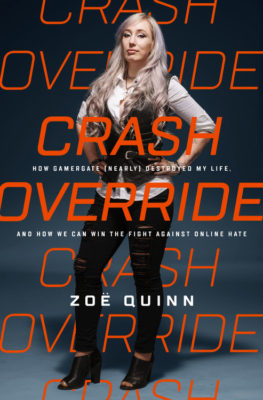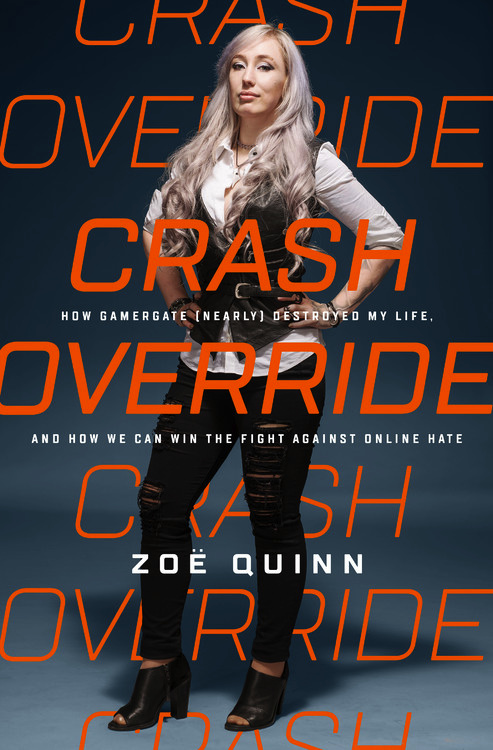In response to a recent Buzzfeed article about behind-the-scenes goings-on of Milo Yiannapoulus’ and Breitbart’s propagation of racist, white nationalist thought, Washington Post journalist Philip Bump declared, “An early chapter of every book documenting the Donald Trump era will be about Gamergate.”

If Bump’s prediction comes to pass, Zoë Quinn’s book Crash Override will be cited by scholars for decades to come as an essential text to understanding the Trump error.
In Crash Override, which is partly an autobiography, Quinn tells the story of Gamergate and how she’s worked to defend everyone against vicious online mobs since.
Quinn had first gotten widespread attention as a video game developer in 2013 for her text-based “Depression Quest”, an interactive representation of what it’s like to experience depression when you seem capable of making only the worst and most unhealthy decisions instead of any good ones.
Depression Quest was unique and creative and earned many positive reviews.
Then, in 2014, Quinn’s abusive ex-boyfriend went online to smear her reputation and accuse her of sleeping her way into getting good reviews.
A group of people — mostly angry young white men — began a sustained campaign of harassment, threats, and stalking that principally targeted Quinn and other women in a series of disturbing incidents that became known as Gamergate.
Quinn’s Crash Override: How Gamergate [Nearly] Destroyed My Life and How We Can Win the Fight Against Online Hate is really more like four or five books, and it’s not exactly a criticism to say that each might have been a full work in their own right instead of portions of this fairly brief two hundred and thirty-eight page one.
Quinn believes the larger underlying problem involves people inside of tech companies being themselves unwilling to solve eminently solvable problems.
Facebook, Reddit, and Twitter are staffed (in part) by the same sort of angry white males who are entirely capable of automating copyright infringement takedowns or visible nipples, but claim nothing can be done about specific, detailed rape threats or exhortations of genocide because free speech is sacrosanct.
Toward the end of the book, Quinn also examines the consequences of society’s failure to confront and counteract abusive behaviors in their early stages.
People have to gradually build their courage for dramatic action. Domestic violence is one of the few common threads connecting men involved in mass murder, even when ideology and means of accomplishing a destructive end differ.
Steve Bannon saw the potential of exploiting such people, but mostly angry young white men (in his words, rootless white men) who could be brought into a movement by first attacking vulnerable people on the Internet over video games and sci-fi culture. He recognized Quinn’s tormenters and people like them could be organized into a political force and harnessed to achieve even more corrosive ends.
Quinn writes that she wasn’t surprised by Donald Trump’s victory in the Electoral College because she had already felt the speartip of a movement driven by nothing more than the hatred of anyone expecting to be treated with equality.
There aren’t more of those people than decent people, but there are enough of them, and they’ve been properly activated and motivated to be harmful.
Having been at the receiving end of the fury of white nationalists and their enablers, Zoë Quinn understands Gamergate better than anyone. Read “Crash Override” if you want to better understand the primordial pools that nurtured juvenile, petty misogyny and racism until it could be brave enough to enthusiastically spread Russian propaganda on behalf of the Trump campaign and demonstrate in public.
They were a figurative torch-wielding mob lighting up their keyboards with “ironic” hatred and doxing before they were a literal torch-wielding mob, actually chanting Nazi slogans and assaulting people in communities like Charlottesville, Virginia.
But don’t just read Crash Override to understand how we got to this sad juncture in our nation’s history. Read Crash Override to understand what can be done now as we live with forms of intimidation and harassment that never could have existed prior to the advent of an always on, Internet-connected culture — and what we still need to do as a society to confront and stamp out these toxic behaviors.


Thank you for this review!